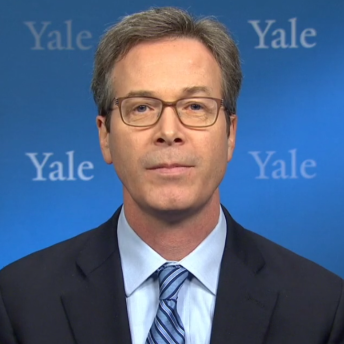

Anthony Leiserowitz, founder and director of the Yale Program on Climate Change Communication (YPCCC), has been ranked second on Reuters “Hot List,” a system of identifying and ranking 1,000 climate scientists from around the world.
Leiserowitz is an expert on the public perception of climate change and environmental beliefs, attitudes, and behavior, conducting research at the global, national, and local scales. He has published more than 200 scientific articles, chapters, and reports, and has contributed to organizations like the National Academy of Sciences, the United Nations Development Programme, and the World Economic Forum.
To create the ranking, Reuters used three criteria: number of research papers published on topics related to climate change; how often those papers where cited by other scientists in similar fields of study; and how often those papers are referenced in the press, on social media, and in policy papers.
In recognition of this ranking, here are a few highlights of Leiserowitz’s many contributions to climate science and climate change communication:
Leiserowitz is an expert on the public perception of climate change and environmental beliefs, attitudes, and behavior, conducting research at the global, national, and local scales. He has published more than 200 scientific articles, chapters, and reports, and has contributed to organizations like the National Academy of Sciences, the United Nations Development Programme, and the World Economic Forum.
To create the ranking, Reuters used three criteria: number of research papers published on topics related to climate change; how often those papers where cited by other scientists in similar fields of study; and how often those papers are referenced in the press, on social media, and in policy papers.
In recognition of this ranking, here are a few highlights of Leiserowitz’s many contributions to climate science and climate change communication:
-
More than a decade ago, Leiserowitz and YPCCC produced their first Climate Change in the American Mind report, conducting nationally representative surveys to investigate, track, and explain public climate change knowledge, risk perceptions, policy support and behavior. Today, the report is produced twice a year, and the findings are published in numerous scientific publications and used by major news organizations around the world. (Dr. Edward Maibach, co-author of the report from YPCCC's partner organization at George Mason University, was also ranked in the top ten of Reuters' list.)
-
Leiserowitz is the host of Climate Connections, a daily radio program produced by YPCCC and broadcast on more than 600 frequencies nationwide. Climate Connections also produces original web-based reporting, commentary, and analysis on the issue of climate change.
-
This year, Leiserowitz delved into visual media, co-starring in the documentary film Meltdown. In the film, Leiserowitz travels with photographer Lynn Davis to Greenland to document the effects of climate change in the Arctic. The film is available on Apple TV and Amazon Prime Video — watch the trailer.
-
Leiserowitz has received numerous plaudits for his work in climate science. In 2012, he was awarded the Environmental Merit Award from the U.S. Environmental Protection Agency and, last year, was the winner of Climate One’s prestigious Stephen H. Schneider Award for Outstanding Climate Science Communication. An initiative of the Commonwealth Club of California, the nation's oldest and largest public affairs forum, Climate One is a leadership dialogue on energy, the economy, and the environment.
In an interview after receiving the Schneider Award, Leiserowitz spoke about the rapid growth in the field of climate change communication, and how meaningful climate action is dependent upon public perception and political will.
“When I started, the field was very small — a few researchers here and there, some who did studies on the side. Today, there is a field of thousands of climate communication scholars and professional communicators around the world. I think part of the reason for that growth was the growing recognition that just getting the science right and developing good policies is not enough,” Leiserowitz said.
“If you’re not communicating climate change well, then you aren’t going to build the public and political will for meaningful climate action. We’re not lacking solutions to climate change — in fact we’ve had many of them for decades. One of the critical things we lack is public demand for those solutions.”
Robert Mendelsohn, Edwin Weyerhaeuser Davis Professor of Forest Policy at YSE, was also named to the list.
Related News
Published
April 22, 2021